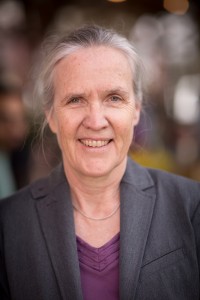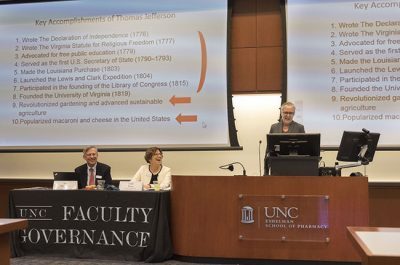Ammerman’s public service honored with Thomas Jefferson Award
October 6, 2017
To Alice Ammerman, DrPH, public health is public service.

Dr. Alice Ammerman
This defining outlook was recognized at the Sept. 8 University of North Carolina at Chapel Hill Faculty Council meeting, during which Ammerman accepted the Thomas Jefferson Award. The Thomas Jefferson Award has been granted to one faculty member each year since 1961; the selection is made based on nominations by fellow faculty of the “member of the academic community who, through personal influence and performance of duty in teaching, writing and scholarship, has best exemplified the ideals and objectives of Thomas Jefferson.”
True to her unique style, Ammerman’s acceptance speech included a funny, Hamilton-esque rap that linked the Declaration of Independence author to recent social justice issues on campus.
Ammerman, who is the inaugural Mildred Kaufman Distinguished Professor of nutrition in the UNC Gillings School of Global Public Health, also serves as director of the UNC Center for Health Promotion and Disease Prevention. The citation for her award was read by Elizabeth Mayer-Davis, PhD, Cary C. Boshamer Distinguished Professor of nutrition and medicine and chair of the nutrition department. Mayer-Davis praised the way Ammerman has consistently combined her public health research with public service.
“Her work is focused on reducing health inequities, particularly as they relate to diet and nutrition, and she’s worked in communities in some of the most vulnerable regions throughout our state,” Mayer-Davis said. “Dr. Ammerman really is the kind of senior faculty member who sets the standard for citizenship and service.”
In addition to heading one of the premier Centers for Disease Control-funded Prevention Research Centers in the country, Ammerman has co-led, with Marcie Cohen Ferris, the “Food For All” University-wide academic theme into its third year. The food theme has resulted in several campus and community programs and events, the establishment of a multi-disciplinary gateway nutrition course for the campus (with plans underway for a food studies minor), and a series of micro-grants to help campus and community entrepreneurs launch their ideas. Ammerman also teaches public health entrepreneurship in the University’s entrepreneurship minor program.
She probably is best known, however, as a researcher who never fears tackling a new public health problem – and nearly every social ill also is a public health problem, as she sees it. Over the years, her center has taken on cardiovascular health in “the stroke belt” of the South, preschool nutrition and physical activity, self-management of chronic disease, as well as empowerment and social support for poor and minority women.
“Part of the secret is being willing to get out of your comfort zone,” she explained. “Researchers need to be able to say, ‘I know nothing about this particular health issue, but I have experience working with communities; I’m anxious to learn more and work on the problem together.’”
One of her newer projects addresses the opioid epidemic in rural areas. “We’re not going to arrest our way out of this as a solution,” she has said. Her response, in fact, was to partner with a rural North Carolina county and write a grant proposal to fund a county-wide opioid task force and intervention. A glitch in the submission process meant that the proposal didn’t get submitted, but that didn’t stop Ammerman.
“As one of my department chairs once said,” she quoted, “‘Never let a good grant proposal die.’” With her partners, she currently is revising the proposal to include the cost of sending a local clinical social worker to receive special training on innovative addiction therapy and to explore novel approaches like home detox.

Dr. Ammerman, at right, reviews some of Thomas Jefferson’s achievements — including popularizing mac and cheese in the United States.
Ammerman always is on the lookout for research opportunities that can benefit North Carolina. She recently collaborated with a former student and alumna of the UNC Gillings nutrition department, Stephanie Jilcott-Pitts, now on the faculty at Eastern Carolina University. Together, they wrote a proposal to evaluate recent state legislation providing grant funding for convenience stores in food deserts to purchase refrigeration equipment for the sale of healthier food options. After a couple of failed attempts, they now are awaiting word on funding from the National Institutes of Health.
Recognizing an opportunity to expand these efforts, Ammerman and a number of community partners also applied for and received funding from the C. Felix Harvey Award to Advance Institutional Priorities at Carolina.
This grant involves creating healthy frozen meals from locally grown meat and produce to be stocked in those new freezers. The concept is similar to the Toms shoes model, in which for every pair of shoes a customer buys, Toms donates a pair to a needy child.
In her quiet, determined style, Ammerman has pulled many different groups together to work on the project, tentatively called Farm Fresh Meals on the Go. First, she convinced Weaver Street Market, a local co-op, to make the meals using her recipes and local ingredients and to sell them at a higher price that would subsidize the meals sold in convenience stores. The meals will be frozen by Seal the Seasons, a Carolina spin-out company that freezes vegetables that North Carolina farmers can’t sell fresh.
The program is just the latest example of how Ammerman looks at a local problem, figures out the public health angle and connects people and ideas to solve them.
Saving the world, one research grant proposal at a time, is all in a day’s work for Ammerman. As she said in her acceptance of one of UNC’s highest honors, “I’m really proud to be part of a University that highly values diversity, cares deeply about the people of our state, wrestles with difficult challenges and allows me to follow my passions while still calling it a job.”
The original version of this article was published by the University Gazette.
Gillings School of Global Public Health contact: David Pesci, director of communications, (919) 962-2600 or dpesci@unc.edu
